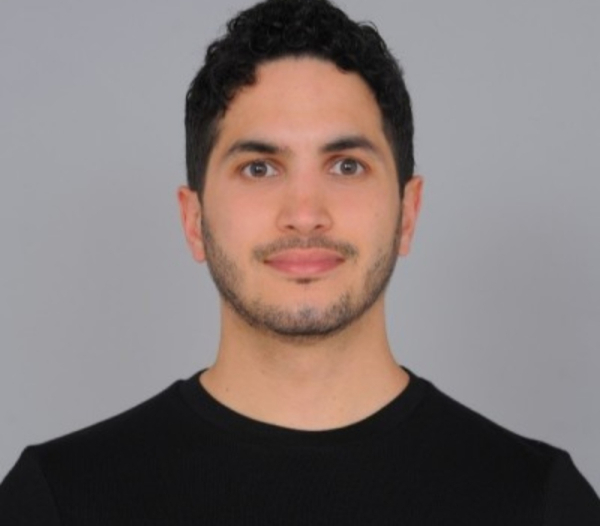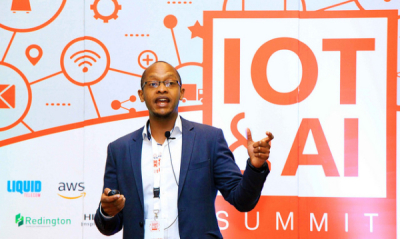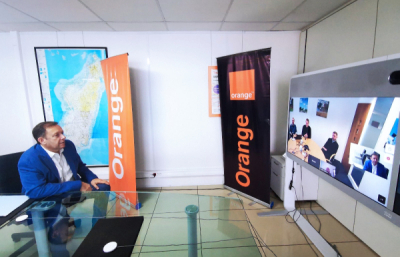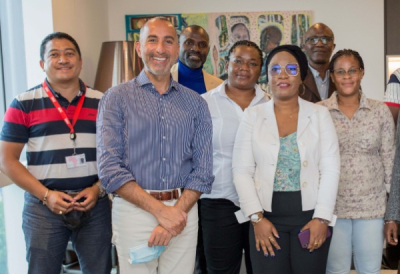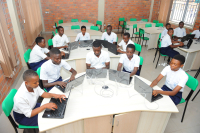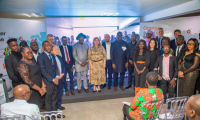To successfully implement its digital transformation projects, Cabo Verde is multiplying partnerships with other countries. After its joint subsea fiber interconnection project with Senegal, it recently partnered with the Portuguese archipelago to promote technological innovation.
Last Wednesday, the Cabo Verdean institute for business support and promotion "Cabo Verde Digital" and Startup Madeira, a business incubator based in Madeira, Portugal, signed a memorandum of understanding aimed at stimulating entrepreneurship and boosting the two archipelagos' digital cooperation.
According to Cabo Verdean State Secretary for Innovation Pedro Lopes, the memorandum will help empower young tech entrepreneurs and encourage collaboration and the development of joint projects.
The agreement comes at a time when Cabo Verde is preparing a major digital project. In fact, the country is preparing its EUR40 million technology park, which the government believes will boost the ICT sector by positioning Cabo Verde as an international service center and as a gateway to Africa for major international technology companies.
Madeira Island is also committed to research and innovation. In 1997, the government launched Startup Madeira to offer real support to project promoters and to work for the creation and modernization of companies in every economic sector.
Thanks to the memorandum, Cabo Verde and Madeira plan to pool their experience to identify future cooperation actions to strengthen their respective entrepreneurship ecosystem and facilitate the development of innovative and digital companies.
Samira Njoya
He is a talented and determined innovator who is applying his engineering and scientific expertise to solving the agricultural challenges faced by farmers in developing countries.
Youssef Benkirane (photo) is a Moroccan entrepreneur who graduated from the Swiss Federal Institute of Technology in Lausanne with a master's degree in engineering, management, and entrepreneurship. He also holds a master's degree in general science and strategic management from CentraleSupélec. In 2022, he co-founded the agritech startup Terraa, which he oversees as the CEO.
The startup leverages innovative technologies to source fresh produce from farmers and deliver it to retailers within hours, connecting farmers with retailers, restaurants, and service providers. Its technology platform enables farmers to earn higher incomes and ensures consistent demand for their products while providing retailers with high-quality goods at competitive prices.
It also reduces food waste and decreases greenhouse gas emissions, freshwater use, and land use, contributing to a more environmentally friendly food supply chain.
In a round led by FoodLabs, a European venture capitalist and food, sustainability, and health research studio, Terraa raised US$1.5 million in pre-seed funding on February 14, 2023. Other investors in the round included UM6P Ventures, Outlierz Ventures, Musha Ventures, and DFS Lab.
"In the next few months, we will build some collection centers in all the major agricultural cities of Morocco. We will use them to store the produce collected from the farmers for distribution to the end customers," Youssef Benkirane told TechCrunch after the funding round.
Since 2021, the tech entrepreneur is an advisor for the decentralized autonomous organization MakerDAO. His professional career started in 2014 when he joined Rolex as an industrial engineer. Concurrently, he was a software engineer for luxury goods retailer Richemont.
In 2015, he was hired by the food and beverage company Try The World as a growth and data manager. Two years later, he joined Argon & Co, a Paris-based management consulting firm, as a senior consultant. In January 2019, he was named a senior partner at the consulting firm Bain & Company, and in December of the same year, he became a consultant at the firm. From 2021 to the creation of Terraa, he was the general manager of Zapp, a grocery retail company.
Melchior Koba
He is a tech entrepreneur with a strong background in data and artificial intelligence. His startup leverages those tools to help businesses engage customers more effectively.
Mutembei Kariuki (photo) is a Kenyan tech entrepreneur with a Master of Science in Information Systems from the Kobe Institute of Computing (Japan) and a Bachelor in Economics and political science from the Catholic University of Eastern Africa (Kenya). He is mostly known as the co-founder and CEO of AI-as-a-service startup Fastagger.
His AI startup, Fastagger, was founded in 2019. It is an AI and blockchain platform that helps merchants and designers increase sales and build customer loyalty. In February 2023, it announced an undisclosed investment from global blockchain investor CV VC and plans to expand its cutting-edge AI and blockchain technology capabilities.
Pleased to now be working with CV VC, Mutembei Kariuki said, "Our focus is on providing innovative solutions that utilize the best of both worlds to create new opportunities for businesses and individuals. I am confident that this investment will help us to accelerate our growth and bring our vision to life. Our team is excited to work with CV VC to achieve our mission and make a real impact in the world."
The tech entrepreneur entered the professional world, in 2007, as a telemarketer for KPMG East Africa. In 2008, he joined The Pacific Institute as a facilitator before becoming the national vice president of talent management for AISEC Austria the following year. From 2010 to 2011, he was the global coordinator of Potencia Ventures. Concurrently, he was the India manager of IDEX Accelerator's Global Fellows Program.
In 2012, he oversaw the Kenyan expansion of the waste manager Shirai group. The following year, he became an associate of the global non-profit organization Acumen. From 2016 to 2017, he worked for the Kenyan training center Amani Institute as a social innovation manager. He has also been the East African regional coordinator of German Development Agency GIZ's tech entrepreneurship initiative Make-IT in Africa (between 2017 and 2019).
Melchior Koba
Orange Madagascar is stepping up investments in rural infrastructure to bring mobile services to the unconnected half of the Malagasy population. The company signed an agreement in January with NuRan Wireless to build 500 new telecom sites over ten years.
Telecom operator Orange Madagascar has signed an agreement with telecom tower builder Africa Mobile Networks (AMN) to further expand its network coverage in rural areas in Madagascar. Under that agreement, the two partners intend to deploy at least 500 base stations under the Network-as-a-Service (NaaS) model over the next ten years.
The sites to be built under this project will support both 2G and 3G. Their deployment has already begun and some are expected to be operational by the end of 2023, we learn.
The partnership comes about a month after Orange Madagascar signed a similar agreement with Canadian company NuRAN Wireless to deploy 500 telecom sites on Madagascar's east coast, as part of its strategic goal to establish itself as the leading digital service provider in the country.
The investment in rural areas is expected to accelerate Orange Madagascar's ambition, as these areas have a high concentration of unconnected people, and therefore potential telecom subscribers. According to the Communication Technology Regulatory Authority (ARTEC), only 46.38% of the Malagasy population has access to mobile telecom services. The project is expected to enable the telecom operator to reach more than one million new subscribers.
It is also expected to support AMN's ambition to help expand the mobile network in rural areas in sub-Saharan Africa with the deployment of 10,000 towers by 2025. In November 2022, it secured US$20 million from Finnfund and BlueOrchard Finance to fund that plan.
Isaac K. Kassouwi
The coronavirus pandemic accelerated digital transformation projects in Africa, boosting demand for digital tools. This creates a funding gap, which is partially filled by investment funds and venture capital firms.
Pan-African diversified group Axian announced Monday (Feb 13), the launch of Axian Investment, an entity that will manage its investments in tech and innovative companies in Africa.
According to the press release issued by the group, Axian Investment will aim to share the group's experience and provide support, directly and indirectly, to companies at different stages of maturity.
"It will empower AXIAN Group to deliver an even broader positive impact through diverse yet synergized investments, reaffirming its commitment to support entrepreneurs and create shared and inclusive values. Meanwhile, supporting Africa’s growing position within the global economy," the release informs.
The Pan-African group kickstarted the implementation of its long-term investment strategy in 2017 by taking indirect stakeholding in companies and startups. To date, it has invested in 20 private equity and venture capital funds "across the world, but with a strong regional focus on Africa."
Currently, its venture capital branch is a minority shareholder in 10 African start-ups. It aims to accelerate its activity and spread across the entire ecosystem (fintech, e-commerce, e-health́, e-logistics...). It will also create synergies with the group's other activities.
Samira Njoya
He is a visionary entrepreneur who focuses on quality and innovation to improve local food systems and provide healthy and affordable food to the population. He founded two start-ups that serve his goal of developing the agricultural sector in Africa.
Shikama Dioscore (photo) is a Rwandan entrepreneur who graduated from the National University of Rwanda with a bachelor's degree in plant biology and conservation in 2012. He is also the founder and CEO of the food distribution startup Food Bundles.
His startup, founded in 2020, wants to optimize the fresh distribution chain in urban areas while creating a resilient and sustainable marketplace for small-scale farmers. Its digital platform specifically connects farmers with buyers in urban areas.
In 2011, he founded AgriGo, another agritech company that helps farmers improve yields.
With an AgriGo account, farmers can access information on virtually any topic that directly affects their day-to-day business. The startup also provides a management platform for agricultural cooperatives that have to manage thousands of farmers. Using its platform, financial institutions can also inform farmers of financing opportunities.
Shikama is one of the founding members of Rwanda Youth in Agribusiness Forum (RYAF), a forum that aims at "promoting and advocating the business of youth who are involved in farming." From 2016 to 2022, he headed the forum's Information and Communication Technology for Agriculture (ICT4Ag) cluster. As such, his work included " engaging the right partners to stimulate the use of ICT4Ag, and develop the youth who are creating technology solutions to boost farming and the agriculture value chain in general."
The Alibaba eFunders fellow (2017) was one of the founding members of the Rwanda Young ICT Entrepreneurs Association, which aimed to inspire "tech Entrepreneurship among young Rwandans, develop strong business and interpersonal skills, and thus facilitate the creation of jobs in Rwanda’s Technology space." He remained a member of the association from 2012 to 2021. Between 2011 and 2012, he was a reporter and Kinyarwanda translator for the Rwandan multimedia company IGIHE.
Melchior Koba
He is a chartered accountant whose professional career includes positions at multinational corporations. He founded the fintech company Lulalend to allow access to quick and transparent business funding for SMBs.
Trevor Gosling (photo) is a South African chartered accountant who graduated from the University of Pretoria, where he studied from 2000 to 2004. He is also a tech entrepreneur. In 2014, he co-founded the financial technology startup Lulalend, which provides South African businesses with the funds they need to grow.
His startup offers up to US$280,000 in business financing to businesses that have been in operation for at least a year and have monthly sales of about US$2,200. The startup has developed a system that uses various data points to analyze loan applicants' financial health, business model, and cash flow potential to enable sound credit decisions.
In February 2023, the startup completed a US$35 million Series B funding round. The financial resources are expected to help expand its operations in South Africa and commercialize new products to improve access to financing for more than 2 million formal and informal small and medium-sized enterprises (SMEs) in the country.
" With this additional capital available, and the support of our investors, we are now better placed than ever to deliver on our vision of driving financial inclusion and acting as a catalyst for growth across the SME sector. […] I’m incredibly excited about the future of Lulalend and the positive impact we can have on South Africa’s SMEs, which as we know are so crucial to the nation’s economic development," Trevor Gosling said.
Before Lulalend, in 2012, Trevor founded 5 ounces, an e-commerce platform specializing in wine and gourmet products. The platform was acquired by Naspers Group in May 2013 but the founder remained its CEO until 2014.
His professional career started in 2005, at KPMG which employed him as a senior accountant. In 2008, he joined Rand Merchant Bank as an investment banker. In the following years, he assumed the same position at Goldman Sachs before returning to Rand Merchant Bank, in 2010, as a structured finance specialist.
Melchior Koba
Rwanda is among the African nations with a commendable level of digital readiness. All sectors are being transformed in the country, including education.
Rwanda wants to connect additional 3,000 schools to the internet by 2024, ICT Minister Paula Ingabire recently indicated during a Plenary Sitting of the Chambers of Deputies.
Responding to questions on the project, she responded "Currently, there are 6,756 schools, including elementary schools, secondary schools, and technical and vocational education and training (TVET) in the country. Of these schools, about 3,000, or 44.4% of the total, are not connected to the Internet."
"We have Smart Education Project, through the US$30 million financing we got from China Exim Bank, under which we will connect at least 1,500 schools," she added.
In addition to China Exim Bank, which is supporting the Rwandan government's digital transformation project, the World Bank approved US$100 million to finance the project in 2021. The aim was to boost access to broadband internet, increase digital use and enhance the digital innovation ecosystem.
According to Minister Ingabire, most of the financial resources were allocated to infrastructure for last-mile connectivity, including Internet access for schools. "By using the funds from the China Exim Bank, and those from the World Bank, it was observed that about 3,000 schools that are not connected to the internet will have access to it by 2024," she said.
For Emmanuel Mfitumukiza, president of the Rwandan chapter of the Internet Society, Internet connectivity in primary and secondary schools will help implement a skills-based curriculum and increase digital literacy in even the most remote schools in the country.
Samira Njoya
The new digital center is the 14th launched by Orange. The 13th was inaugurated in Guinea last December.
Last Friday, telecom group Orange and German Cooperation agency GIZ inaugurated "Orange Digital Center" (ODC) Sierra Leone, the 14th ODC in the Middle East and Africa.
The digital infrastructure, based in Freetown, spans over 500m². Like the previous 13 similar infrastructures, it hosts Orange group's four strategic programs including notably a coding school, a fab lab (FabLab Solidaire), a startup accelerator (Orange Fab), and a venture capital fund (Orange Ventures Afrique et Moyen Orient), which invests in promising startups that emerge from the ODC.
According to Brelotte Ba, Deputy CEO of Orange Middle East and Africa, the 14th Orange Digital Center "is part of a network of 32 Orange Digital Centers that will be deployed not only in Africa and the Middle East but also in Europe by 2023." "The objective is to democratize access to digital technology for young people – with or without qualifications. We want them to be part of the digital transformation of their country by encouraging them to become digital entrepreneurs, to create local content and thus develop the digital economy of Sierra Leone," she added.
The digital infrastructure comes at an opportune time for Sierra Leone, which recently began implementing its national digital transformation project with a US$50 million grant from the World Bank. Orange's hands-on initiative supports the government's push to leverage digital tools for job creation, skills development, and the development of new opportunities.
The center will offer free digital training to students and deploy Orange Digital Center Clubs in selected universities, complementing the education system to "give as many people as possible access to new technologies and support them in using these technologies to their full extent."
For Jens Kraus-Massé, German ambassador to Sierra Leone, the "aim is to empower every woman, every girl, every man, and every boy no matter from what background, to take advantage of the opportunities of digitalization, to get better jobs and eventually a better life for them and their families."
Samira Njoya
In Africa, traditional financial institutions are usually unable to meet the needs of part of the population. This creates a great funding gap that tech entrepreneurs are trying to bridge with innovative solutions.
FairMoney is a fintech solution developed by a Nigerian startup, which aims to "build the leading mobile bank for emerging markets." It allows its users access to instant collateral-free loans.
"Banks stayed apart from this untapped market because of the lack of digital tech expertise to serve people with limited revenues in remote areas. […] We leverage digital technologies to offer financial services to people, even for very small transactions and loans, in remote areas. [...] We hit a US$93 million disbursement volume in 2020, despite COVID-19 which impacted lending businesses," said Laurin Hainy, CEO of FairMoney.
Through its Android app, users can create a FairMoney account by filling the required form. They specifically need the telephone number linked to their Bank Verification Numbers.
Once they create the account, they can link a bank account or card to that account and start receiving loans. The startup requires no documentation but, it is worth mentioning that thanks to the BVN, it can identify its users. In its FAQs, the startup explains that it "collects and processes securely data from your phone (SMS, device details, location, phonebook) to make a lending decision. This data is necessary for us to approve your loan in real-time without asking you for cumbersome paperwork." Since the launch of its instant loan solution, the startup has attracted thousands of users. Playstore stats show the Android app has been downloaded more than 10 million times.
Adoni Conrad Quenum
More...
After years of studying and then working in North America, he returned home to solve energy access problems by introducing renewable energies. With SunFi, he offers attractive payment plans and better services to clean energy consumers.
Rotimi Thomas (photo) is one of the co-founders and CEO of the fintech company SunFi. The Nigerian entrepreneur is a business administration and environmental management graduate from Duke University's Fuqua School of Business and Nicholas School of the Environment in North Carolina.
The fintech startup he oversees, SunFI, was founded in 2021. It "connects people who want solar energy access to payment plans that match their needs." By leveraging technology, it matches its subscribers' needs "to the right energy solution and solar installers."
Recently, in February 2023, the startup raised US$2.325 million in seed funding with Nairobi-based Factor[e] and SCM Capital Asset Management as lead investors. Participating investors included Voltron Capital, Norrsken Impact Accelerator, Ventures Platform, and Sovereign Capital.
In an interview with TechCrunch, Rotimi Thomas explained that the financial resources would help SunFi expand operations and improve its ability to match subscribers with the best and most affordable systems.
Before SunFi, in 2019, the CEO took part in the creation of Aspire Power Solutions, a solar installer that completed over 500 solar projects in Nigeria. His professional career really started in 2005, when he joined the financial services corporation TD Waterhouse Canada Inc. as an investment representative.
About three years later, he joined the financial firm PTC Accounting & Finance as a recruiter before returning to TD Waterhouse in 2009 as a senior investment representative. In 2011, he was hired by The Walt Disney Company as a renewable energy consultant.
In 2012, he was a leadership development intern and risk analyst at Constellation Energy. He was then recruited by the energy company Siemens as a senior associate controller and commercial project manager. In 2014, he was promoted to performance assurance manager for the company's Smart Generation Solutions portfolio in Germany.
The following year, he was appointed head of finance and strategy for Siemens Microgrids USA and, in 2016 he became the investment manager for the company's development fund in Africa. From 2017 to 2018, he was the market development manager for Siemens Power Generation's Gas 2 Power project in Sub-Saharan Africa.
Melchior Koba
Broadband Internet service provider Starlink is currently pursuing its strategy to capture some 20 African markets. So far, the company has launched operations in Nigeria and is looking to do the same in Kenya and Tanzania.
The Tanzanian government has blocked the process that would allow Elon Musk (photo) and his company Starlink to provide Internet services in the country. On Wednesday, February 8, Tanzania Communication Regulatory Authority (TCRA)'s Director General Jabiri Bakari told the press that Starlink will have to complete essential documentation before the procedure can go ahead.
"You know, Starlink’s satellite internet involves much more issues than the way it is portrayed on social media platforms. It involves different particulars that need different requirements from the regulator in line with the type of license being applied for," Jabiri said.
On October 6, 2022, Starlink applied to provide its satellite internet services in Tanzania. After a meeting on January 27, 2023, some issues were still not resolved. The internet service provider blames the government for not communicating the documents required for the application. On Twitter, Elon Musk indicates that Starlink is ready and just waiting.
Starlink is slated to launch in Tanzania between January and April 2023, if the application is approved. The service will be available in Dar es Salaam, Arusha, Tanga, Tabora, and Mwanza. This will greatly boost the digital sector with the broadband internet connection provided.
Samira Njoya
On January 5, 2023, Algerian team SevenG won the second prize in the finals of the global competition organized by Huawei. It won the prize thanks to its AI tool that automates farming. At a time when food insecurity is hanging over millions of people all over the world, the seven students who launched the tool believe that it is an efficient and less restrictive solution to make farming more profitable. In an interview with We Are Tech, they present their ambitious project.
What inspired you to launch FarmAI?
We were inspired by the food insecurity affecting Algeria and several countries in the world. We decided to develop an IT system, combined with other tools, which would help create a smart farm, monitor crops, identify pests, build a smart irrigation system, and monitor weather changes. The main idea is to quickly detect and efficiently respond to diseases affecting farms.
How does your solution work?
The early wheat rust disease detection system combines artificial intelligence and drones to monitor wheat fields. The drone flies around the field every 4 days, capturing images of the plants with its camera. This data is then transferred to a deep neural network that performs image classification and analysis to identify possible infections. If a set of data points at a high infection probability, the system will alert the farmer through a mobile app and backend system, allowing the farmer to take the necessary actions to preserve crops and avoid financial losses.
We already have audiences with the Ministries of Economy and Agriculture. They will help us either partner with local drone manufacturers or purchase our drones. In both cases, the great support offered by the President of the Republic to agritech and startups is a real opportunity.
Why did you choose artificial intelligence to power your solution?
We didn't choose to use artificial intelligence (AI) because it's a trendy technology or something like that, but our problem requires a lot of effort, time, and money. So, as we all know, AI improves the speed, accuracy, and efficiency of human actions. Those are the reasons we chose AI for our FarmAI project. At this stage, we are using AI in two key functions which are computer vision and the automation of drones that monitor farms, process images and classify them.
Given the potential of artificial intelligence, why limit the solution to the identification of wheat rust only?
At the beginning of the Tech4good competition, our idea was to develop a system that would help reduce losses in farms and ensure food security in our country. But, as we were time-limited and our project was focused on a specific feature, which is the detection of rust disease, even before the competition, our mentors advised us to pursue this feature. Nevertheless, we plan to add other features, including pest detection and the detection of other diseases. We plan to deploy our solution in more farms.
Our focus on wheat rust stems from the position of wheat in the Algerian economy. Algerians consume more than 100 kilograms of wheat yearly. The country produces and exports the commodity, which is a great source of income for households and the whole country. Our solution helps address food and economic issues not only in Algeria but also in the whole world.
What are SevenG's plans for FarmAi after Tech4Good?
The next step is to test our solution. We have already spoken with farmers and most of them are interested. The solution has been developed in such a way that it is easy to use even for non -tech-savvy individuals. Since most farmers are already using smartphones, they only have to check the reports since everything that has to do with drone calibration, launch, and data analysis is automated.
Once we are done with the testing phase, we will offer free trials to farmers to convince them of the usefulness of our solution. Then, we will seek investors to quickly develop our business and get more clients.
The Angolan tech sector has steadily risen in the past few years. To keep the impetus, the government wants to attract foreign investors who can contribute their expertise to the implementation of its digital strategy.
Last Thursday, Angola hosted a Polish business delegation on the sidelines of the Angola-Poland Business Forum held in its capital that day.
In the opening remarks, Zdzislaw Sokal (photo, right), chairman of the Polish Investment and Trade Agency, indicated that his country is ready to invest in the Angolan key digital infrastructure and cybersecurity since it has great potential in the digital and cybersecurity sectors.
"We have solutions in the sectors of green energy, circular economy, waste management, photovoltaic energies, and smart cities," he said.
According to the Polish executive, Poland is a digitally-advanced country. Public and private services are digitized in several sectors including health, transportation, and mobility. Also, every year, the country releases 11,000 tech graduates on the job market and has 131 telecommunication and communication technology firms.
Therefore, with the future partnerships between the two countries, Angola can capitalize on Polish experience and assets to implement the numerous projects planned in its digital strategy.
In January 2023, China granted Angola a US$249 loan for the construction of a 2,000-kilometer terrestrial optical fiber to facilitate innovation and boost productivity in the public and private sectors.
Samira Njoya



